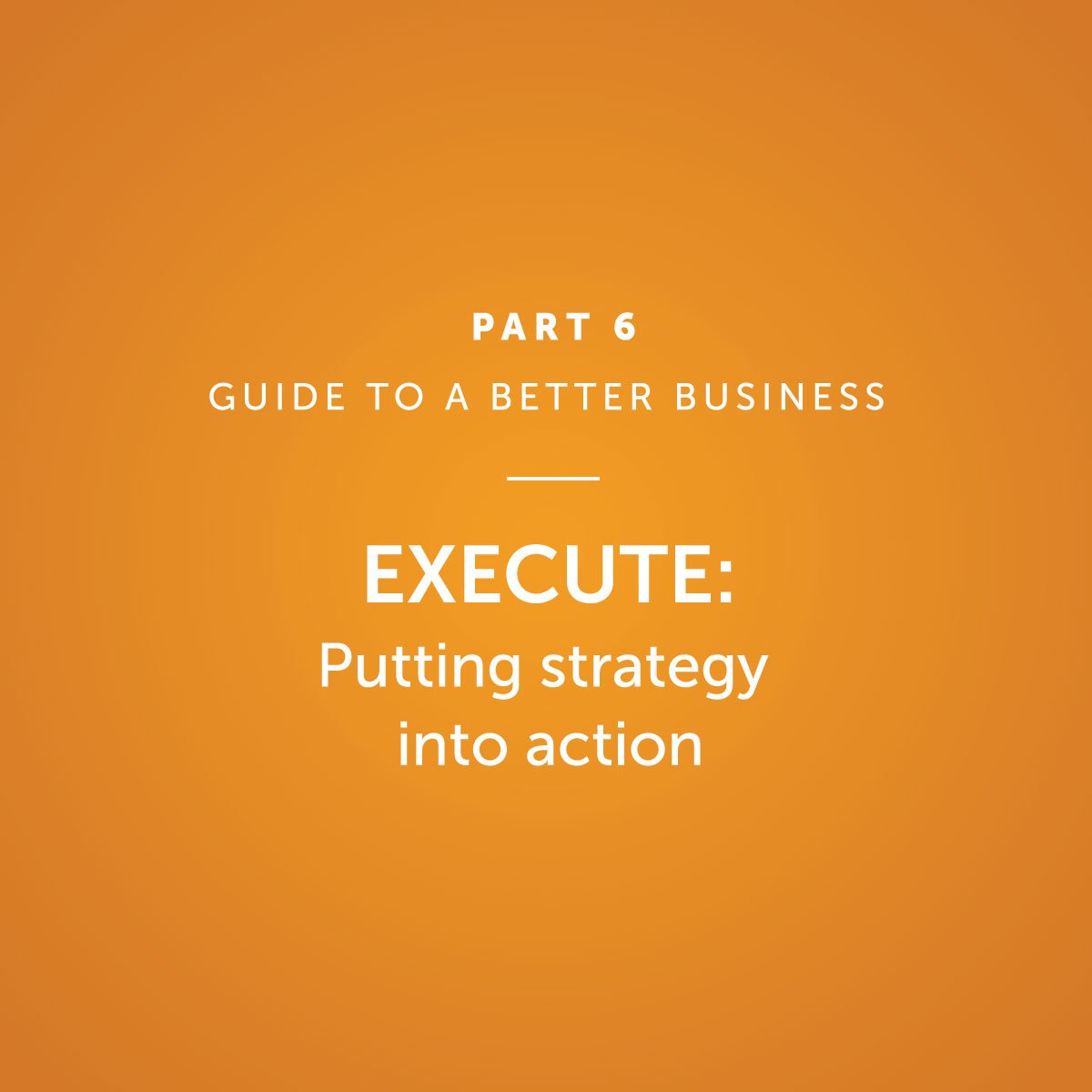PART 6 – GUIDE TO A BETTER BUSINESS
EXECUTE:
Putting strategy into action
Putting strategy into action
C
T
I
O
N
Success, Pupose, Freedom, Fulfilment, Peace
You’ve managed to work out your Big Picture (the first cornerstone of business success) and now you’re working on the second, which is Action.
The first anchor of action is already in place: your strategy. You’re confident of how to get where you need to be but you still haven’t got to the really difficult part.
DOING it. Executing the strategy. That’s the really tough bit where so many business owners struggle.
But, for Business Mentor Club members, it’s a lot easier…

You’ve managed to work out your Big Picture (the first cornerstone of business success) and now you’re working on the second, which is Action.
The first anchor of action is already in place: your strategy. You’re confident of how to get where you need to be but you still haven’t got to the really difficult part.
DOING it. Executing the strategy. That’s the really tough bit where so many business owners struggle.
But, for Business Mentor Club members, it’s a lot easier…
What does it really mean to execute a strategy?
Bob is overweight; he smokes; he’s constantly eating fast food, drinks too much and never exercises.
Without doubt, Bob knows he should quit smoking, cut back the drinking, go on a diet and start exercising regularly.
But knowing what to do isn’t the same as doing.
If Bob never actually makes any of these changes, he’ll just face increasing health challenges forever more.
This is similar to a business that is heading for failure.
Execution requires motivation to change, a long-term commitment and a framework to keep you focused on incremental progress.
How do you properly execute your strategy?
Our approach is very similar to the Four Disciplines of Execution by Chris McChesney.
The 4 Disciplines of Execution
Identify the next most wildly important goal
We can’t do everything at once and there are always more good ideas than there is capacity to execute.
Focus on one important goal and see it through. It doesn’t mean that other competing goals aren’t important; but they need to wait until later, when you’re ready.
Concentrate on what you can change/influence
Think back to Bob, the overweight smoker. There’s no point Bob focussing on the idea of losing weight and being healthier; these are simply the results he’s looking for.
Instead, he needs to implement a diet and exercise regularly. These are the factors that Bob can influence, hopefully leading to weight loss and improved health.
Keep score
We’re all human and want to see progress.
It’s motivating to know that our efforts are actually moving the needle, just like Bob jumping on the scales for a regular weigh-in.
Accountability
Assume that Bob has made a promise to his family to improve his health.
It’s far more difficult for Bob to lapse back into old habits if he catches up with his family on a regular basis to discuss his progress and they celebrate his achievements together.
Leverage: you don’t need to do it all
Aim to build a team of capable people around you, so that you don’t need to do everything yourself.
Delegating tasks to responsible team members or outsourced service providers brings a variety of benefits:
- You’ll have capacity to execute more goals.
- You might not be the best person to perform a task. If you lack creativity skills but another team member has a flair for it, the website project will turn out better.
- It can have a self-fulfilling effect on employee engagement.
In his fantastic book The Truth about Employee Engagement, Patrick Lencioni explains that the three key attributes for staff to enjoy their job are:
- They feel understood and appreciated by someone in a position of authority. If they feel invisible, generic or anonymous, they cannot love their jobs, no matter what they do.
- They can see that their job is important and matters.
- They can gauge their progress and contribution for themselves. They cannot be fulfilled in their work if their success depends on the opinions or whims of another person.
So, if you have team members help you with the important execution items, you’ll likely cover all three of these attributes.
They’ll feel trusted and appreciated. When you explain to the employee just how much the task means to you, the business or your customers, they’ll see that their job matters. And, if you set deadlines for accomplishing tasks, they can assess their own progress.
Do it – because your competitors aren’t
Execution is the most important aspect of operating a successful business.
Success won’t happen overnight. You’ll be striving to do the things that so many of your competitors neglect, simply because they are hard.
But it’s incredible to see what can be achieved over time with focus and effective execution.

Do it – because your competitors aren’t
Execution is the most important aspect of operating a successful business.
Success won’t happen overnight. You’ll be striving to do the things that so many of your competitors neglect, simply because they are hard.
But it’s incredible to see what can be achieved over time with focus and effective execution.



Leave A Comment